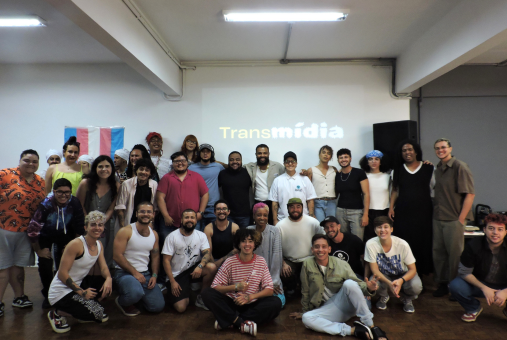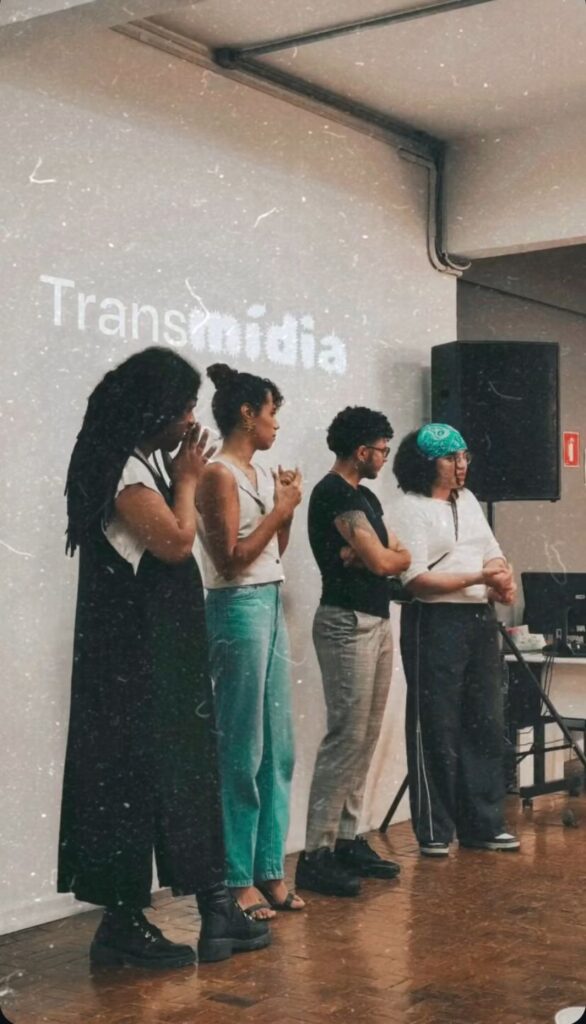Trans issues have become central to political debates in Brazil. Last month, the most-voted city council candidate in São Paulo ran on a platform that denied rights to transgender people. Beginning in January, he will serve alongside a transgender woman, who received the fifth-highest number of votes in the city.
These elections marked the first in Brazil covered by a media outlet dedicated to trans issues, with a team composed entirely of transgender people. Launched this year, Transmídia produces journalism by and for Brazil’s trans population, which is estimated at around one million people.
“The first media outlet led by trans journalists focusing on these issues emerged during elections where transphobia was a major political topic,” said Caê Vatiero, co-founder and institutional director of Transmídia, in an interview with the LatAm Journalism Review (LJR). “This is incredibly impactful for us.”
Transmídia’s coverage focused on combating disinformation about trans issues spread by candidates. Reporting was distributed over Instagram and WhatsApp, and the outlet also hosted in-person training sessions for 100 people, 72 of whom were trans, to address election-related disinformation.

One of the training sessions held by Transmídia on election-related disinformation. (Photo: Courtesy of Caê Vatiero)
“What other journalism organization has trained 72 trans people on disinformation?” Vatiero asked. “We reached an audience that journalism typically overlooks, which is crucial because we have been deeply affected by disinformation and are often its target.”
The seeds of Transmídia were sown during weekly online meetings of trans journalists that began in 2020 amid the COVID-19 pandemic.
“We felt abandoned, even professionally,” Vatiero explained. “Initially, we came together to connect and ask: Where are Brazil’s trans journalists?”
During these meetings, participants shared their experiences in the workplace, expressing frustration over inadequate coverage of trans issues. Journalists often faced challenges pushing beyond superficial narratives or statistics about violence. Inspired by niche digital outlets in Brazil, the group decided to create a platform for trans-led reporting on trans issues.
“The birth of Transmídia stems from our need to survive,” Vatiero said. “There’s a significant lack of understanding about the trans community, which poses challenges for us.”
Transmídia launched its website this month with two feature stories: one on quotas for trans students in universities and another on how municipal election candidates targeted trans children in their campaigns.
The site has four sections: "Acué," a term meaning "money" in Pajubá, a language created by Brazil's LGBTQIA+ community, focuses on work, economy, and entrepreneurship; "Vital" covers health and wellbeing; "Navalha" addresses politics and human rights; and "Esquinas" explores education, culture, and leisure.
The names of the editorial sections, Vatiero said, refer to trans culture and memory—two aspects neglected by traditional journalism. He believes there is a “historical reparation” to be made by journalism toward Brazil’s transgender population.
“Brazil has been the country that kills the most trans people in the world for a long time,” said Vatiero, citing monitoring conducted by the organization TGEU, which for 17 years has ranked Brazil at the top of the global list of trans homicides. According to him, news coverage typically focuses on the violence faced by trans people without delving into the roots and impact of this violence or addressing other aspects of trans experiences.

Transmídia co-founders: Hela Santana, Sanara Santos, Caê Vatiero and Agatha Lotus. (Photo: Courtesy of Caê Vatiero)
“When we talk about trans issues, we’re not just talking about gender. We’re talking about racism, territory, public policies, education, and health,” Vatiero said. Trans issues are transversal issues.”
Transmídia also aims to publish stories to help trans people access their rights, he said.
“There are things that are mundane in our daily lives. For example, how do I access hormone therapy? Or how do I add my social name to my voter registration card?” said Vatiero. “When we search for this information, we find texts full of misinformation or outdated content. We want to provide qualified journalism for this so that people can access their rights.”
Transmídia’s co-founders include Vatiero and three others: designer Agatha Lotus, the organization’s project director; writer and screenwriter Hela Santana, content director; and journalist Sanara Santos, journalism director.
While building Transmídia, the co-founders are maintaining their regular jobs. Vatiero works at Article 19, and Santos is one of the directors at Énois, an organization that supports communication collectives in the peripheries of Brazil’s cities.
Transmídia was selected for two funding programs by Énois. The first allowed Vatiero to participate in the Tech Camp Belém 2023, organized by Énois, which led to the creation of a national network of journalists promoting local and diverse journalism. The second was the Diversity in Newsrooms – Misinformation and Elections program, which funded Transmídia’s election coverage.
Amanda Rahra, founder and operations director of Énois, told LJR that there is a connection between Santos’ presence—she is a Black trans woman from the periphery—on Énois’ leadership team and the organization’s shift to address the informational needs of the trans population. Rahra also cited misinformation about trans issues during the electoral campaign as a reason for selecting Transmídia for the election coverage program.
Fifteen years ago, when Énois was founded, addressing gender meant focusing on girls and women, Rahra said.
“Fifteen years ago, elections would never have included this debate on transgender issues,” she said. “We’ve watched this issue grow. It’s a topic that has been germinating. And the fact that there is a collective [like Transmídia] and that Énois can support this collective as it emerges is very important for us.”
In addition to Énois funding, Transmídia was selected for the 2023 GNI Startups Lab program by the Google News Initiative and participated in a project funded by the 2024 Small Grants Program of the U.S. Embassy in Brazil.
The team is currently working on financial and sustainability planning, deciding which projects to prioritize and which fundraising strategies to pursue in 2025, Vatiero said.
Despite being newly launched, Transmídia has already established partnerships with other Brazilian digital native outlets interested in improving their coverage of trans issues.
With the digital magazine Nonada, Transmídia investigated attacks on trans children by municipal election candidates. Anna Ortega, journalism coordinator at Nonada, told LJR that the Instagram post with the article received many transphobic comments, prompting the profile administrators to disable comments on the publication.
“We realized that certain topics face barriers even on the platform itself. And the backlash, with many attacks, validates the article's central issue: transphobia,” she said.
Ortega said that Transmídia could help journalism organizations in Brazil understand the importance of broadening their perspectives on trans issues and including trans people in their teams and as sources.
“Outlets like Transmídia ensure that the trans population is consistently covered in areas like health, education, and culture—not just occasionally, as traditional media tends to do,” said Ortega.
The feminist digital native magazine AzMina, founded in 2015, is also a partner of Transmídia. The two outlets plan to produce and share content on social media, Aymê Brito, AzMina’s audience manager, told LJR. The first collaboration was a post featuring an article by Caê Vasconcelos, an AzMina columnist.
Collaborations with other outlets are a way to reach new audiences, Brito said. She added that AzMina increasingly feels the need to cover issues important to the trans population. In 2023, dedicating the month of March to trans women in a series of posts in partnership with Gênero e Número, the two outlets faced transphobic attacks on social media. In response, both organizations reinforced their “commitment to journalism against transphobia,” as they wrote in a shared post.
“Independent journalism ends up pushing news coverage where it needs to go,” Brito said. “Independent journalism has been innovative in giving more voice to Black people, bringing perspectives of class and race, and focusing on issues important to the population. We have the responsibility to point out the path that Brazilian journalism should follow. Transmídia will pave a way not only for niche outlets but also for journalism in general to follow.”